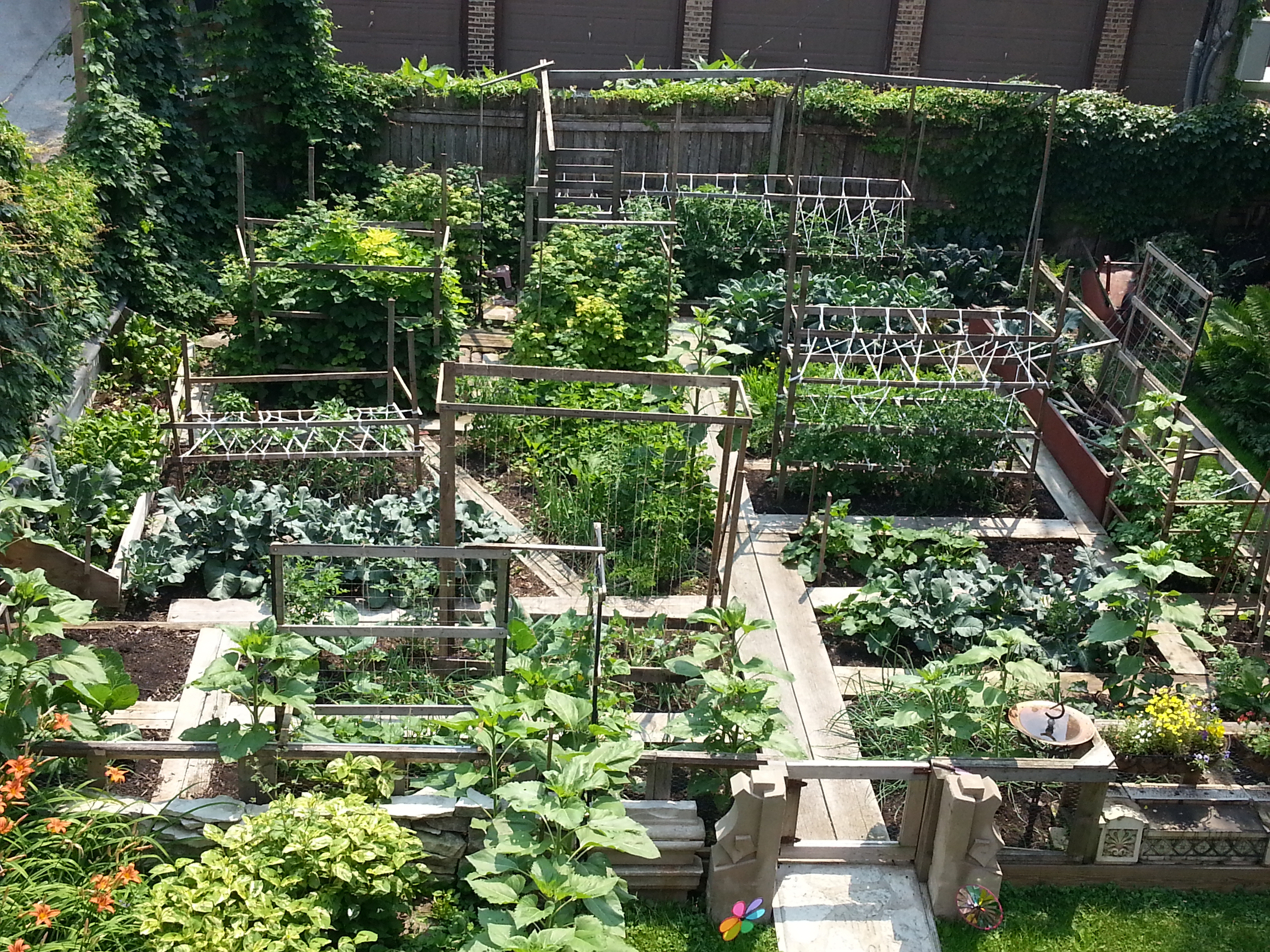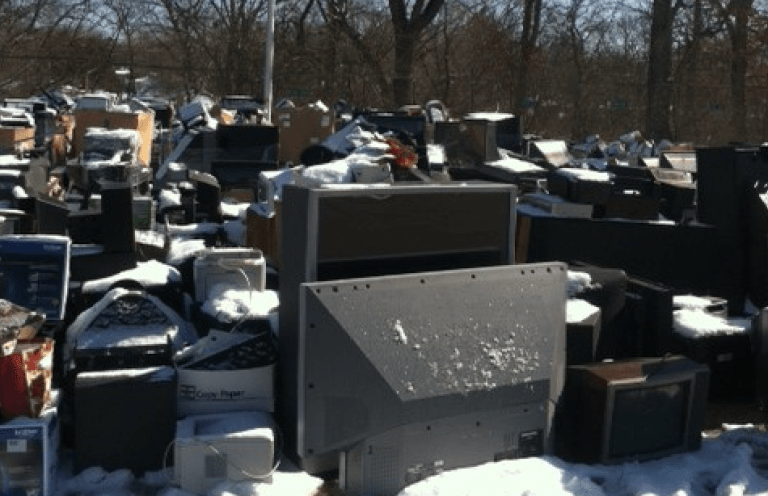April 3, 2016 – Chicago Farm Report, Band of Farmers and fixing electronics recycling laws
Oh, hum…how positively ordinary to be doing a radio show from inside a studio this week. That’s what happens when you broadcast live from a great event like the Good Food Festival & Conference. If you missed the show last Saturday, you can catch the podcast here.
Chicago Farm Report
One of the people who joined me last week was Patrick Barry, who has just started a Facebook page and blog called Chicago Farm Report. It is also the name of a brand new segment on The Mike Nowak Show. Patrick and others on his staff will join me regularly to report on the world of urban agriculture, Chicago style.
 And if you’re wondering what qualifies him to make these reports, I advise you to take a look at the photo above. That’s his yard in the middle of last summer. I think he knows what he’s doing, and I welcome him to the show.
And if you’re wondering what qualifies him to make these reports, I advise you to take a look at the photo above. That’s his yard in the middle of last summer. I think he knows what he’s doing, and I welcome him to the show.
Band of Farmers: The Chicagoland CSA Coalition
One of the folks who got left out of the mix last week was Robin Schirmer with an outfit called Band of Farmers: The Chicagoland CSA Coalition. Their purpose is to educate consumers about local foods in general and the CSA (Community Supported Agriculture) model in particular.
As it so happens, I might have had a hand in helping this group of farmers get organized. Recently, Schirmer wrote to me,
In early December 2013, you interviewed Jody Osmund and Wes King about their budding (and as yet unnamed) marketing coalition for CSAs. I was listening, and had recently given notice to Tomato Mountain Farm (where I coordinated their large, home delivery CSA) and the only prospect that excited me was a longstanding itch to help create a CSA coalition like the one in Madison. I knew both Jody and Wes and connected with them and Band of Farmers was born in early 2014 (though by design we didn’t go live until the 2015 season).
Well, whaddaya know.
Anyway, in addition to the serious side of Band of Farmers, there is  the not-so-serious side–namely, the 4th Annual Farmer Talent Show. They describe it as “the event that started it all” and it features music, dance, storytelling, comedy and performance art–all performed by farmers, of course.
the not-so-serious side–namely, the 4th Annual Farmer Talent Show. They describe it as “the event that started it all” and it features music, dance, storytelling, comedy and performance art–all performed by farmers, of course.
The show takes place next Saturday, April 9 from 3 to 6pm at The Hideout, 1354 W. Wabansia Avenue in Chicago.
Today I welcome Jody Lee Osmund from Cedar Valley Sustainable Farm, Marcy Prchal from Troggs Hollow and Stephanie Douglass from Growing Home Inc. to talk about their businesses individually and collectively as Band of Farmers.
What happened to electronics recycling in Illinois?
Back in the heady days of 2011, the Electronic Recycling and Reuse Act passed in Illinois, which banned 17 electronic items from landfills. According to the Illinois Environmental Protection Agency, effective January 1, 2012 these electronic devices listed were banned from landfills: televisions, monitors, printers, computers (laptop, notebook, netbook, tablet, desktop), electronic keyboards, facsimile machines, videocassette recorders, portable digital music players, digital video disc players, video game consoles, small-scale servers, scanners, electronic mice, digital converter boxes, cable receivers, satellite receivers, and digital video disc recorders.
Yay! Finally, the good guys win!
Fast forward to 2015-2016, and these are the kinds of headlines you’re seeing in this state:
- Why it’s harder to recycle your old TV
- Kane to maintain recycling program as electronics drop-off sites close
- Future of free electronics recycling sites in Lake County questioned
- Will County closes all recycling centers
- Moken plans to shut recycling center
- Best Buy now charging for TVs and computer monitors–but can’t collect them in Illinois
What the heck happened?
Kane County recycling coordinator Jennifer Jarland, who appears on my show today, writes,
Back in 2012, when the Electronic Products Recycling and Reuse Act banned electronics from landfills and required manufacturers of electronics to fund recycling programs in Illinois, there was money flowing from manufacturers to recycler/processors, and even down to the collectors.
At that time, the county was able to pass along a per-pound revenue to the cities that were acting as collection locations. That heyday lasted a couple of years, until 2014, when the volumes being collected began to exceed the weight goals the state has set for the manufacturers. Once annual weight-goal requirements are met, manufacturers don’t have to fund the recycling programs, and without the additional revenues, costs are threatening to fall back to local governments.
 The Illinois law was revised in 2015, but it still didn’t do the job! One of the problems is the fact that so many people are now trying to recycle their old cathode ray tube (CRT) televisions, which weigh much more than current models and which contain toxic materials that cost more to recycle. Houston, we have a problem.
The Illinois law was revised in 2015, but it still didn’t do the job! One of the problems is the fact that so many people are now trying to recycle their old cathode ray tube (CRT) televisions, which weigh much more than current models and which contain toxic materials that cost more to recycle. Houston, we have a problem.
We’ll try to straighten out this mess with Jennifer Jarland and with Walter Willis, executive director of the Solid Waste Agency of Lake County, Illinois (SWALCO). Willis notes that the Illinois Product Stewardship Council is suggesting yet another batch of amendments to the law, some of which have been borrowed from what he calls more stable programs in Oregon and Washington.
We’ll see how that works out.

